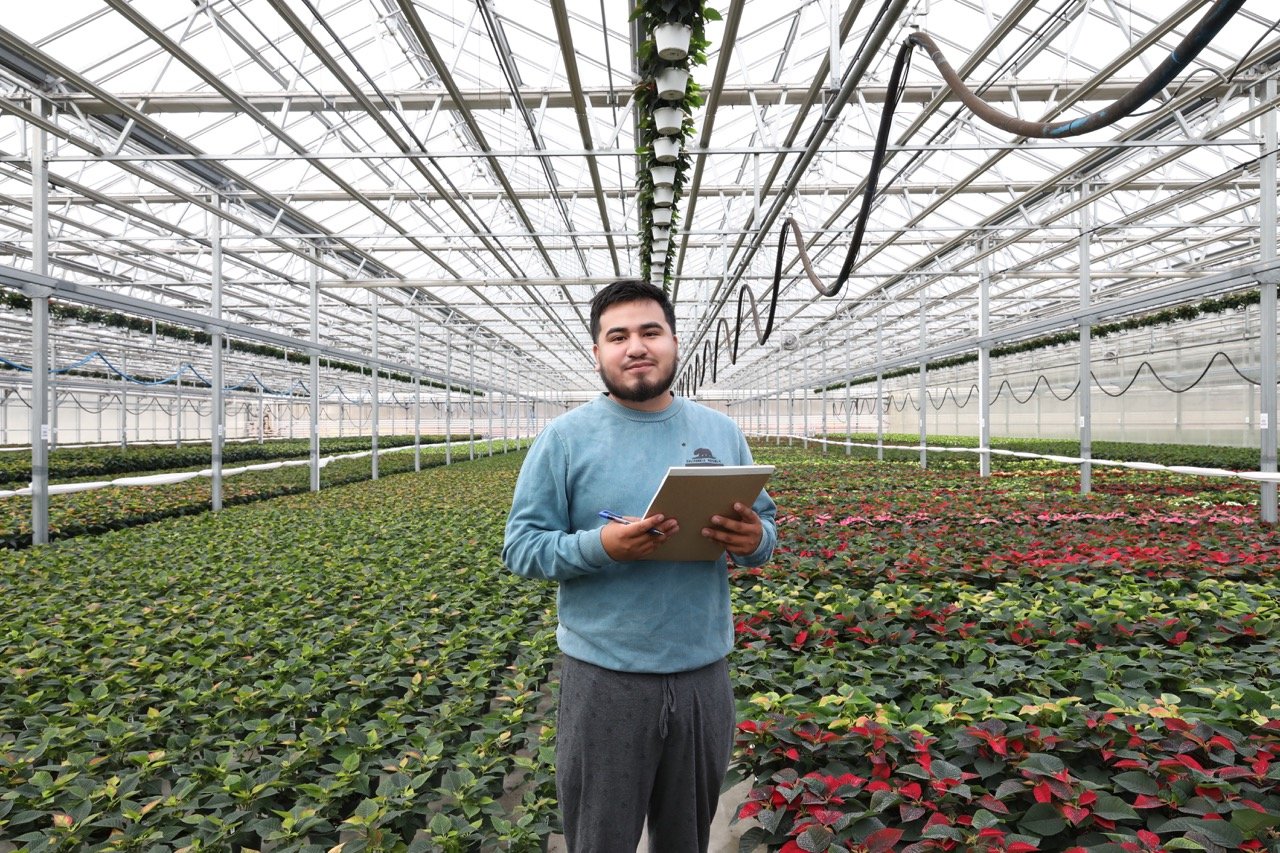South Jersey screenwriter and farmworker organizer harvests change through film
Edgar Aquino-Huerta, a screenwriter, filmmaker, and community organizer at Farmworkers Support Committee, poses for a photo in South Jersey. Photo: Evodio Cruz
Editor’s Note: The following article is part of “Through Our Lens,” a series of short stories about filmmakers and media-makers in the entertainment industry. Storytellers in the Through Our Lens series discuss identity, the power of art, and the need for equitable opportunities for immigrants.
As Edgar Aquino-Huerta (he/him) was earning a bachelor's degree in radio, television, and film at Rowan University, he was working at one of the biggest greenhouses in South Jersey. His experience in the nation's agricultural industry and learning about the work of labor organizer Dolores Huerta jump-started his own call to action to advocate and fight for farmworker rights.
In 1998 at the age of two, Aquino-Huerta and a relative migrated from a small town in Puebla, Mexico, to South Jersey in search of opportunities.
"Since I was a kid, I connected with my last name Huerta the most since I was more attached to my mom's side of the family. I knew the last name Huerta was going to represent me well when I got older," Aquino-Huerta said. "I joke around to people that my grandmom is Dolores Huerta because I'm following the steps of her legacy."
Dolores Huerta co-founded the National Farm Workers Association alongside Cesar Chavez in 1962 and worked in partnership with Filipino labor organizers such as Larry Itliong of the Agricultural Worker Organizing Committee, Philip Vera Cruz, and Pete Velasco. Together, they organized the historic Delano Grape Strike of 1965, advocating for pay increases, labor and worker protections, and the right to form a union. Solidarity between Filipino and Mexican farmworkers across California revolutionized the farm labor movement in the United States and led to the formation of the United Farm Workers of America, the first and largest farm workers' union in the country.
But along the Atlantic Coast lives another history of grassroots organizing and a community of migrant and seasonal farmworkers from Mexico, Central America, Puerto Rico, Haiti, and Jamaica who make up a vital part of New Jersey's agricultural economy. Farmworkers are paid about $11.05 an hour (below minimum wage) and are exempt from overtime pay, according to the New Jersey Department of Labor and Workforce Development.
"Farmworkers do one of the hardest jobs and are exposed to things they're unaware of, like pesticides that can create short and long-term effects. They're so focused on making money for their families back home that they don't prioritize their health, mentally and physically," Aquino-Huerta said.
Aquino-Huerta is an organizer at the Farmworkers Support Committee (CATA), which works with farmworkers and the Latino/a/x immigrant community in New Jersey, Pennsylvania, and Maryland. CATA's services include educational workshops and training that address workers' rights, workplace discrimination, HIV/AIDS awareness, and COVID-19 infection prevention. Aquino-Huerta's favorite part is helping community members without status apply for a driver's license and teaching families the benefits of applying for a state ID.
"They can drive freely without being afraid of being stopped. I'm not giving them money. I'm giving them something that they're doing on their own. I'm just guiding them on how to do it. Who knows? Hopefully, in the future, we'll get immigration reform, and they'll apply for a work permit, and at least they are already prepared, and they're already one step ahead right now," Aquino-Huerta said.
After a break from pursuing filmmaking to study criminal justice instead, Aquino-Huerta realized he didn't need to become a lawyer to make a difference in his community. He continued to create short films about his identity and journey battling two worlds: not being American enough for Americans and not being Mexican enough for Mexicans.
"I understood what it felt like to be an agricultural worker. I understood what it meant to be a leader. I understood what it meant to be unapologetic," Aquino-Huerta said. "One of the biggest impacts of my career is because my screenwriting professor at Rowan University encouraged me to always tell my stories and to not seek validation from people that don't understand my community."
His most recent short film, Made In America (2021), is about two rival workers who must help each other escape an Immigration and Customs Enforcement raid at their workplace. The film not only inspired his peers to learn about farmworkers but also to take action and volunteer for causes dedicated to food justice.
In 2021, he created Voices of the Soil, a platform that centers the stories of his people and the work they do in the community. Through Voices of the Soil, Aquino-Huerta aims to build representation in South Jersey, educate viewers about the history, struggle, and joy of agricultural workers, and inspire audiences to value the workers that feed them.
His ambition to follow his filmmaking dreams grew after traveling to Los Angeles.
"I was still finding myself. I was debating whether I should still move over there. One of my friends I met asked me, 'why don't you come to educate yourself here, take all of this back home, and start something over there?' I'm very blessed because I have friends from both the organizing and filmmaking sides who are helping me grow," Aquino-Huerta said. "I always leave LA feeling motivated, and when I come back home, I try to sprinkle that anywhere and transition that into my origins and horror stories. I want to touch their hearts in many ways."
Aquino-Huerta remembers growing up watching Goosebumps and telenovelas with his mom. But his love for horror films grew even more after watching Scream (1996) for the first time. He plans to write more horror stories, create an attraction in fall 2023 that combines horror with agriculture, and establish a space for local artists to create and share content throughout South Jersey.

